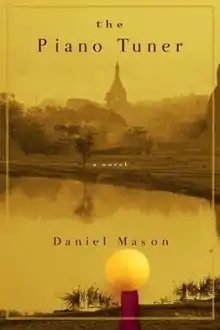The Piano Tuner
The Piano Tuner is a historical novel by Daniel Mason, set in British India and Burma. It was first published in 2002 when Mason was 26 and was his first novel.[1]
 First edition | |
| Author | Daniel Mason |
|---|---|
| Country | United States |
| Language | English |
| Genre | Historical fiction |
| Published | 2002 Alfred A. Knopf |
| Media type | Print (hardback & paperback) |
| Pages | 368 p. (hardcover) & 336 p. (paperback) |
| ISBN | 1-4000-3038-2 |
| OCLC | 53051198 |
The Piano Tuner was the basis for a 2004 opera of the same name (composed by Nigel Osborne to a libretto by Amanda Holden) and is also due to be released as a film directed by Charlie Stratton. The film is to be produced by Mulberry Films LLC, Latitude Media & BCDF.
Synopsis
The novel is set in 1886, in the jungles of Burma. The protagonist, a middle-aged man by the name of Edgar Drake, is commissioned by the British War Office to repair a rare Erard grand piano belonging to a Doctor Anthony Carroll. Carroll, who is the root of many myths, had the piano shipped to him as a means to bring peace and union amongst the princes in Burma in order to further the expansion of the British Empire. The extreme humidity of the tropical climate soon rendered it useless and horribly out of tune. Drake's "mission" thus becomes vital to the Crown's strategic interests. In a series of sub-plots and intrigue the surgeon-major is charged with treason. When the piano tuner goes to meet the surgeon-major against the wishes of the military staff, he finds himself suddenly surrounded.[1]
Reception
The book has been thematically compared with Conrad's Heart of Darkness.[1][2] Andrea Barrett, in The New York Times, called the book "thoroughly engaging" and said that the character of Drake was its greatest achievement, though both she, as well as Hermoine Lee in The Guardian, said that the historical digressions in the book were "clumsy" or "sat stiffly".[1][2]
Adaptations
The novel was adapted into an opera by Nigel Osborne, to a libretto by Amanda Holden, which premiered at the Linbury Studio of the Royal Opera House in 2004.[3]
References
- Barrett, Andrea (29 September 2002). "A Few Strings Loose". New York Times. Retrieved 20 January 2012
- Lee, Hermoine (17 January 2003). "The Lost Chord". The Guardian.
- "The Piano Tuner, Linbury Studio, Royal Opera House, London". The Independent. 14 October 2004. Archived from the original on 2022-06-18. Retrieved 21 December 2018.